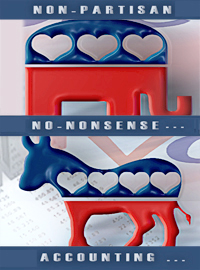| Voters Reward Courage and Trust in Wisconsin, San Jose |
 |
|
By Ashton Ellis
Thursday, June 07 2012 |
Having the courage to speak the truth and trusting citizens to vote accordingly aren’t qualities normally associated with politicians these days. But after the votes were counted in Wisconsin and San Jose, CA on June 5, two reformers stood head-and-shoulder above their fellow elected officials. In Wisconsin’s 2010 gubernatorial race, Republican Scott Walker had the temerity to campaign on economic transparency. His pitch to Badger State voters was simple. If you want more private sector jobs, the state must cut taxes and regulations. Wisconsin taxpayers also needed to rollback their unaffordable commitments to public employee unions because, "There's just benefits in particular that are just woefully out of balance with where the private sector is." For that, Walker was accused of “wrecking” state services by Marty Beil, the executive director of the Wisconsin State Employees Union. Sensing that major reform was coming, Beil asked, “Who can we call on to save us when [Walker] starts destroying the entire state?” Quite a few people it turns out. Teacher union members abandoned their classrooms to protest in Madison. Activists and occupiers from around the country descended on the capitol. The AFL-CIO and other Big Labor groups emptied their treasuries on recall efforts. Even the state police union was openly sympathetic to the uncivil disobedience of their so-called fellow public servants. The spark that ignited the unions’ rage was Walker’s Budget Repair Act of 2011, a comprehensive reform bill that eliminated collective bargaining for most public employees, increased their health insurance co-pays and reduced pension multipliers. All of those changes reformed Wisconsin state employees’ benefits to be closer to – but still better than – their private sector counterparts. To withstand the immense pressure to fold, Walker relied on experience. Before becoming governor, Walker was the Milwaukee County executive, essentially a local government CEO. During his tenure, Walker pushed through the same types of wage and pension reforms contained in the Budget Repair Act. He knew from experience that voters reward a politician who cuts taxes and reduces spending while maintaining services. Once again, time was on Walker’s side. Part of the genius of the Budget Repair Act was that it allowed local government agencies like school boards to immediately renegotiate union contracts. The biggest savings went to school districts where boards opted out of the previously mandated health insurance coverage from WEA Trust, the health insurance provider of the Wisconsin Education Association. The districts that chose cheaper competitors avoided layoffs. Those that stayed with WEA Trust issued pink slips. No wonder 38 percent of union households in Wisconsin voted to retain Walker as governor. His reforms saved jobs. Another courageous truth-teller is San Jose Mayor Chuck Reed. Reed, a Democrat elected in 2006, decided that the city had to make a choice between funding generous pensions for public safety workers like police officers and fire fighters, or canceling services like libraries and police staffing. Convinced that voters could be trusted to make a reasonable cost-benefit analysis, Reed promoted Measure B, a citywide ballot proposal that requires public safety workers to make a choice: Either contribute an additional 16 percent of salary – on top of the current 11 percent – to keep the local pension system solvent, or retire later and take less in benefits. If you think San Jose’s new pension option sounds draconian, consider the alternative. Reed estimates that in the first year alone the new law will save San Jose $25 million in pension costs. With that money now freed up, Reed plans to reopen four libraries that have been shuttered as a result of pension obligations crowding out other social services. But as with seemingly any reform in California, the voters will not have the final say. On the day after San Jose passed Measure B, the city and its public sector opponents filed legal briefs; San Jose in federal court, the public unions with the state. In both cases, the validity of Measure B will turn on whether pension agreements are ironclad contracts, or open to renegotiation when money gets tight. The voting public is no longer sympathetic to claims by public sector employees that any decrease in their benefits is illegal and an affront to democracy. Politicians like Scott Walker and Chuck Reed are using that reality to present voters with real solutions to the fiscal crisis gripping governments at every level. Walker’s reforms saved jobs and money. Reed’s proposal lets public safety workers decide whether early retirement with an annual pension equal to or greater than a year’s salary is worth the cost. Voters can be trusted to act like adults when politicians give them a no-nonsense accounting of costs and benefits. Thanks the uncommon courage of Walker and Reed, they got a chance to prove it. |
Related Articles : |
























